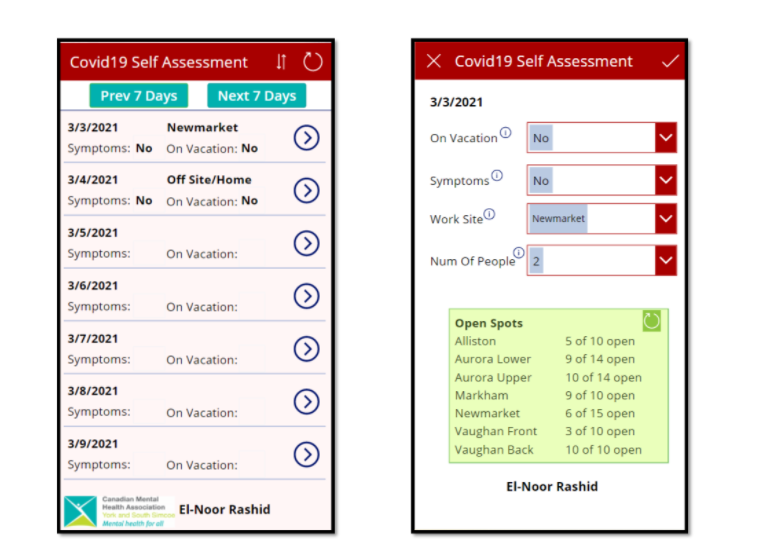The Canadian Mental Health Association York Region and South Simcoe (CMHA-YRSS) has made some technical advances throughout the pandemic with the help of an Ontario Trillium grant.
“The pandemic has required and inspired us to do more for our clients,” said El-Noor Rashid, senior director of digital strategy and experience for CMHA-YRSS. “Empowered by the OTF’s grant, CMHA expanded our service offerings to provide more clients with virtual mental health programs ensuring we could support them through the pandemic and beyond.”
The agency developed a COVID-19 app to ensure physical distancing and contact tracing at their sites, which is still being used today.
“We still had a need to provide in-person service for certain clients through their treatment,” Rashid said. “You’re now in a pandemic, we have five or six sites for CMHA, how do we manage a nurse going into the Newmarket branch or the Aurora branch?”
With the app they designed, nurses or anyone else using a space could see how much availability there was and book a time slot in advance to ensure no site was over capacity.
Rashid said the system was “a very convenient way of determining the number of people at a site to ensure social distancing because the last thing that you want is 50 people showing up where a site should only accommodate 10.”
The app also helped with contact tracing when someone tested positive for COVID-19, as they could use their analytic dashboard to determine who was there at the same time and could have been exposed.
While the Trillium grant money didn’t come in until mid-2020, thanks to some forward thinking and an agreement with the developer, CMHA-YRSS was able to have their app up and running by April.
“When there’s an urgent need, the show must go on. We had to deliver something then,” Rashid said.
He said he was confident they would receive grant money, from the Ontario Trillium Fund or elsewhere, so he approached the CEO for approval and partnered with a developer who agreed to not bill them until the grant money came in.
“It’s been great that we have forward-thinking leadership at CMHA that can make connections, that can get the grants that are needed, Trillium being one of them,” he said.
When the Trillium grant did come in, Rashid said “that really saved us,” as they could use the money to pay for the app and dashboard, as well as buy some new laptops for staff, and other grant money CMHA received could support their other virtual initiatives.
One of them was helping clients stay in touch to prevent loneliness and depression.
“We had a lot of clients that had no way of communicating with friends, family, other relatives, or CMHA,” Rashid said.
With additional grants, the organization was able to purchase smart phones, tablets and data plans for people to stay in contact.
According to Rashid, about 150 to 200 devices were provided to people in need.
Outside of the grants, CMHA-YRSS made a number of other technical upgrades prompted by the pandemic.
In February 2020, 90 per cent of all interactions with clients were done over the phone, while 10 per cent were in person.
Once COVID-19 hit, in-person visits made up just five per cent of their interactions with clients. Phone interactions accounted for just 50 per cent, while 30 per cent of their interactions shifted to encrypted email.
Rashid said the organization is now able to send important forms and questionnaires using secure email instead of having to go through with the client and answer them in person or over the phone, saving a lot of time.
“The pandemic, I have to tell you, it was a breakthrough from the point of view of moving us even further toward this digital transformation,” he said.
He said in his experience, the entire health-care sector, not just CMHA, has been reluctant to move toward digital because it’s not something they’ve grown up with, but now that’s shifting due to the pandemic.



